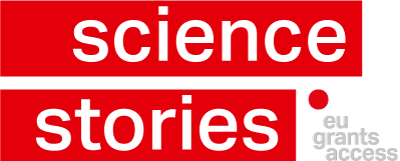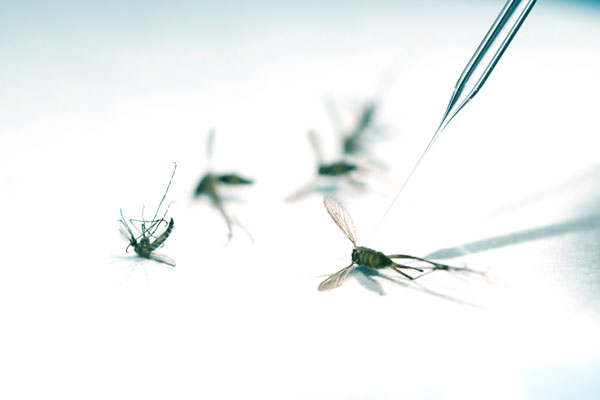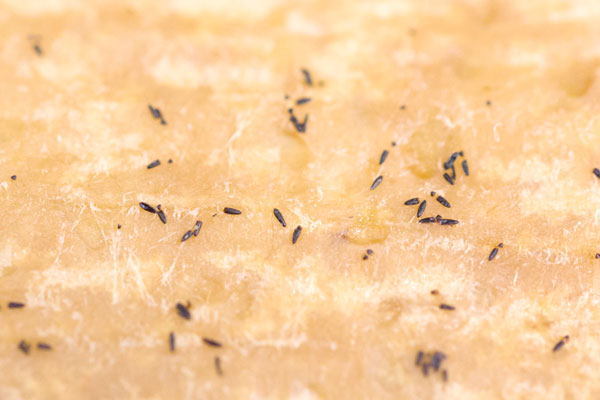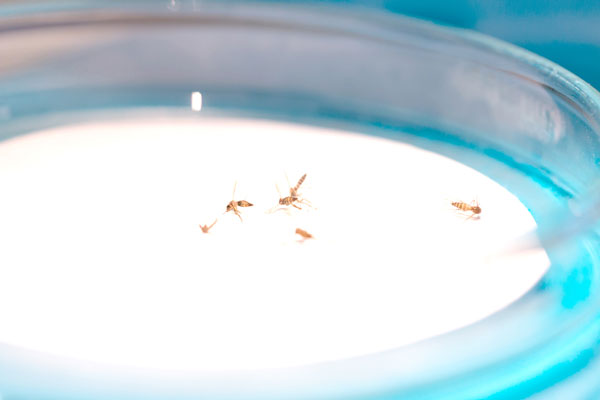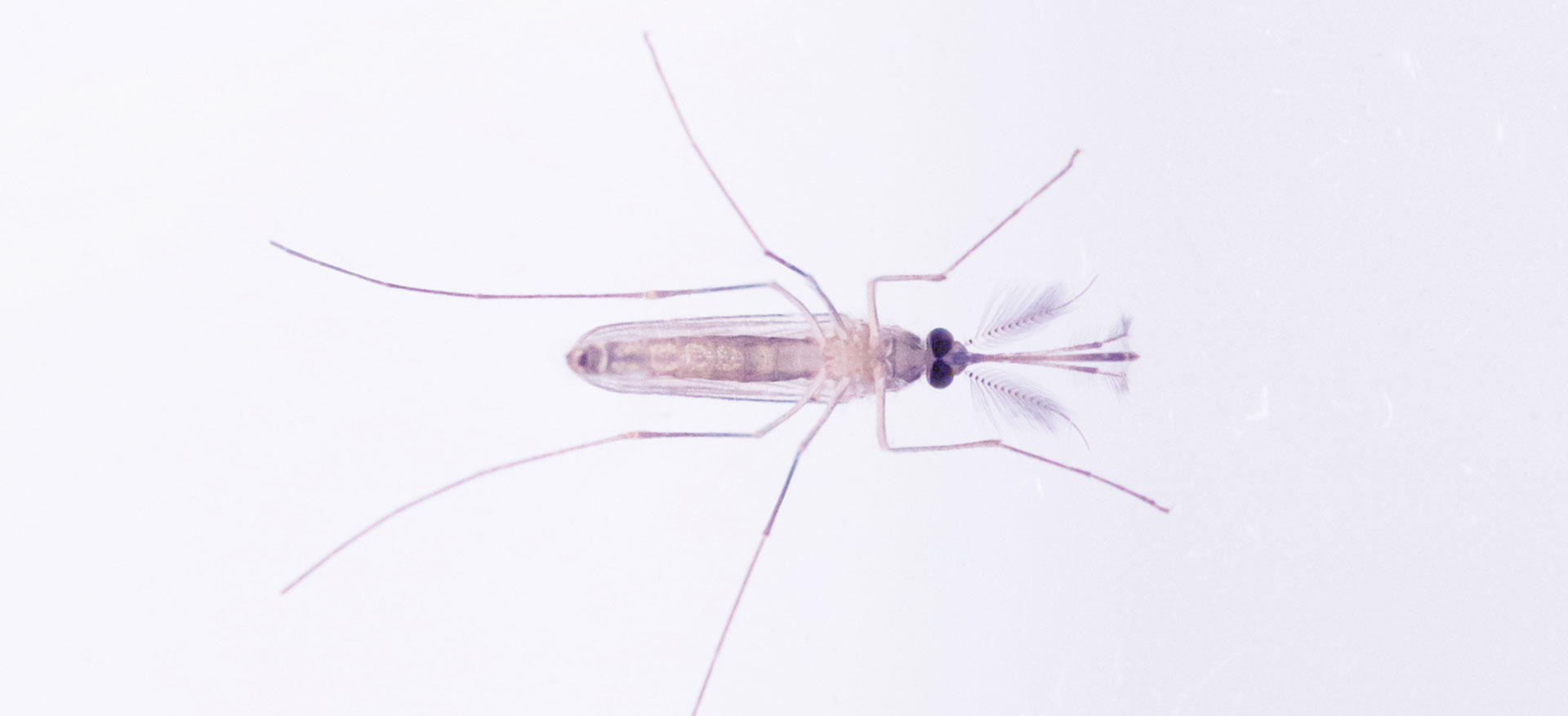
Eva Veronesi has a passion for mosquitoes
At the Institute of Parasitology of the University of Zurich, the entomologist Eva Veronesi focuses, among other topics, on introduced bloodsuckers that have the potential to infect humans and animals with exotic viruses.
Among laymen, Eva Veronesi’s enthusiasm for her research object is initially quite difficult to understand. For more than the past 25 years and with an undiminished passion, she has delved into the topic of bloodsucking gnats (mosquitoes and biting midges). The Asian tiger mosquito is her personal favourite – of all things, this exotic stranger, which has already become established in southern Ticino and can occasionally be observed north of the Alps, with the potential to transmit diseases. However, looking at close-ups of the Aedes albopictus, which is the scientific term for the Asian tiger mosquito, we can comprehend the entomologist’s fascination.
«Not only is the Asian tiger mosquito
beautifully marked, it also flies
very elegantly.»
The microscopic images show a filigree, almost fairylike figure with black and white rings on its body. Even the six long, delicate little legs have stripes in black and white, especially the hind legs. «Not only is the Asian tiger mosquito beautifully marked, it also flies very elegantly,» Eva Veronesi raves. This graceful creature appears to be the darling of many mosquito researchers. Eva Veronesi and her research colleagues of the «European Society for Vector Ecology», which she headed as President for five years until the end of 2018, founded a tiger mosquito club and wear T-shirts bearing the insect’s image during their meetings.
Exotic disease carriers in Europe
In defiance of its enchanting and innocent appearance: Its sting can be dangerous for us. The Aedes albopictus is a so-called vector, a term used in biology and medicine for the carrier of pathogens. Eva Veronesi, as a Senior Scientist at the Institute of Parasitology of the University of Zurich, conducts research on mosquitoes transmitting disease agents on to humans and animals. For example, the stinging females of her favourite mosquito may infect us with the Zika virus, the dengue virus or the chikungunya virus. The tropical virus chikungunya first appeared in Europe in 2007. After a rapid spread in Central and South America, about 200 people in Italy contracted the pathogen in short order, causing high fever and flu-like symptoms. The virus was afterwards detected occasionally in other European countries; this year, it was observed in Spain for the first time.
Globalisation, increased travelling, climate and environmental changes
The globalised merchandise trade as well as people’s desire to travel have brought the mosquito, indigenous of tropical regions, and its virus to Europe. Climate and environmental changes further facilitate its settlement in our regions. In parts of Italy, France, Spain or Greece the Asian tiger mosquito is already considered «established»; Switzerland’s hot spot is the Ticino. The mosquito was detected during the summer in the surroundings of Basel-Stadt and in Zurich as well.
«I am still enthusiastic about
contributing to the prevention
of diseases concerning humans and
animals by means of my research.»
The entomologist of Italian descent is internationally known for her research. The Asian tiger mosquito is not her only area of interest; she also focuses on the yellow fever mosquito (Aedes aegypti), the Asian bush mosquito (Aedes japonicus), and biting midges (Culicoides species) which can infect, among others, ruminants with the bluetongue virus. When she started her career, it was not obvious that she would one day dedicate her life as a researcher to these tiny bloodsuckers. Eva Veronesi had set out to become a behavioural scientist and focused on birds in the beginning. But in 1995, the student was offered a collaboration opportunity for a mosquito control project at the Centro Agricoltura Ambiente «Giorgio Nicoli» in Italy. Among other topics, she dealt with the breeding and identification of mosquitoes, biting midges and sandflies; she also coordinated the supervision of the mosquito control in the regions of the Emilia-Romagna, Piedmont, Lombardy and Sicily. «I do like birdwatching very much, however, studying mosquitoes that transmit pathogens was a greater challenge,» she recalls. After her studies in biology, she specialised in her PhD thesis, which she achieved in Great Britain, on the bluetongue disease caused by biting midges. Eva Veronesi worked at the renowned British Pirbright Institute before joining the University of Zurich in 2014 (see Box). «I am still enthusiastic about contributing to the prevention of diseases concerning humans and animals by means of my research,» she says.
Important scientific evidence due to EU project
Eva Veronesi is an internationally connected researcher. By means of the large-scale EU project ZIKAlliance, the Zurich Institute of Parasitology collaborates with 54 research centres from all across the globe – mainly universities and health institutions – to find out whether the Asian bush mosquito is able to transmit the Zika virus as well. The European Union started to invest in the Zika virus research and its transmission after a Zika epidemic spread from Brazil to many countries in South and Central America in May 2015. An infection is especially dangerous for pregnant women as it may lead to severe deformities in foetuses. The images of babies that were born with deformed little heads caused by underdeveloped or malformed brains scared Europeans as well. This ambitious EU project is coordinated by Inserm, the French National Institute of Health and Medical Research.
So far, the yellow fever mosquito has been considered the main vector for the transmission of the Zika virus. This mosquito type is yet unable to establish itself in Central Europe due to the cold winters. Now, Eva Veronesi and her team investigate within the scope of the EU project whether the Asian bush mosquito could transmit the virus as well. This type of mosquito settled in Europe, including Switzerland, some ten years ago. Veronesi’s team collected mosquito eggs at two sites in Switzerland and had mosquitos developed from them in the laboratory. They were then fed with blood infected with the Zika virus. In case the virus can later be detected in the mosquito’s saliva, it is considered a potential vector. The result will be published shortly in a scientific journal: Yes, the Asian bush mosquito is able to transmit the Zika virus. «This conclusion is of the outmost importance,» Eva Veronesi states. She is glad that her team achieved this scientific evidence. «This means that we have to focus on this mosquito as well in our quest to prevent Zika.»
«It is great to see that I as
a researcher can help
to prevent epidemics.»
What is more, in 2017, Eva Veronesi’s team was able to prove that the Asian bush mosquito can transmit the West Nile virus. This disease appears mainly in birds, but it may also affect humans and horses. The invasive bush mosquito, indigenous of the cooler regions of Japan and China, has spread across large parts of North America and to Europe, caused by the globalised trade with second-hand car tyres in which they like to place their eggs, just like the Asian tiger mosquito. The West Nile virus may also cause high fever and flu-like symptoms; roughly one percent of those infected, especially the elderly, may even face life-threatening meningitis and cerebral inflammation. In addition, research at the Institute of Parasitology has shown that the Asian bush mosquito is also able to transmit the dengue virus which belongs to the same genus as the Zika and West Nile virus.
Prevention measures required
Does this imply that we will have to expect a future increase in tropical diseases in Switzerland and generally in Europe? The entomologist provides an at least somewhat reassuring outlook. «The mosquito does not naturally carry the Zika or dengue virus. It must sting an ill person first before it can transmit the virus on to more people.» Despite many cases of people infected with Zika were counted in Switzerland, all of them were imported, that is they were infected abroad. So far, no one was infected by a mosquito carrying the Zika, dengue or chikungunya virus in Switzerland. However, Eva Veronesi emphasises the importance of prevention measures in order to observe the expanding exotic mosquito populations, to control their potential diseases and to reduce them. In her opinion, the European policy is still acting with too much reserve when it comes to the novel potential disease carriers. And yet, a monitoring, interlinked collaboration and anticipatory preparation could «minimise the risks.» For example, the larvae of these vectors develop in containers filled with water – flowerpots and saucers, rainwater tanks – but also in car tyres. Back in 2016, when the Asian tiger mosquito was detected in the Zurich main station’s coach carpark and in the Wollishofen district last year as well, the city of Zurich was quick to take action. It established a monitoring with mosquito traps, spread a biological agent on breeding sites killing the mosquitoes, informed the local residents and asked them to avoid leaving containers filled with water standing outside.
EU offers free education and research materials
This kind of control, prevention and public information is also the aim of the Infravec2 EU Project in which Eva Veronesi heads a work package. The international and interdisciplinary project with about 24 partners is a Horizon2020 infrastructure project. Via a website, Infravec2 offers free access to products and services for the research on insect vectors. Eva Veronesi travels a great deal within the scope of this project, as the free materials and services are mainly aimed at countries needing them most but are insufficiently equipped in their fight against the carriers of diseases, such as African or Latin American countries. She travels as an adviser for the Infravec2 project and offers diagnostics courses to scientists; she encourages them to enhance their laboratories with new research materials from the EU programme and she informs the governments about prevention measures. The EU funds these services and materials with ten million Euros.
Eva Veronesi is enthusiastic about the two EU projects. For the large-scale ZIKAlliance Project, the entomologist collaborates for the first time with medical professionals. «We have a great respect, even a downright admiration for each other – I am learning immensely from them,» she says. And she enjoys the Infravec2 Project, as it deals with specific application. «It is great to see that one’s own research benefits the people and that I as a researcher can help to prevent epidemics.» She only wishes that the governments – also the ones in Europe – would come to realise the importance of investing in the prevention, she states. One of her main tasks in this project is, therefore, to advance the communication between science and government agencies, the implementation of control methods in developing countries and the dissemination of knowledge concerning all the diseases that may be caused by a single mosquito sting.
Interview with Eva Veronesi
Eva Veronesi
Eva Veronesi
is an Entomologist and focuses on insects that can transmit viruses on to humans and animals. She started her work in this field in 1995 at the Centro Agricoltura Ambiente «Giorgio Nicoli» (Italy). As of 2002, she devoted her research at the Pirbright Institute in Great Britain during twelve years to the bluetongue disease virus and the transmission mechanisms of Culicoides types. She earned her PhD at the Royal Veterinary College of London. Since 2014, she is a Senior Scientist at the Swiss National Centre for Vector Entomology of the Institute of Parasitology at the University of Zurich appointed by the Swiss Federal Food Safety and Veterinary Office (BLV).. Her research focus as a group leader is on the interaction mechanism of arboviruses and vectors. Arboviruses (the acronym for arthropod-borne viruses) are viruses that are transmitted by arthropods (such as gnats and ticks). The Centre and her research are supported, among others, by the Federal Food Safety and Veterinary Office. Eva Veronesi participates in two projects funded by the EU’s Framework Programme for Research and Innovation Horizon2020: ZIKAlliance (Grant Agreement No. 734548) and Infravec2 (Grant Agreement No. 731060).
Horizon2020-Projekte
ZIKAlliance: A Global Alliance for ZIKA Virus Control and Prevention
- Programme: collaborative project ”Health”
- Duration: 48 months, 54 partners
- Contribution for University Zurich: 175,813 CHF
Infravec2: Research capacity for the implementation of genetic
control of mosquitoes-2
- Programme: collaborative project ”Research Infrastructure”
- Duration: 48 months, 24 partners
- Contribution for University Zurich: 185’000 €
